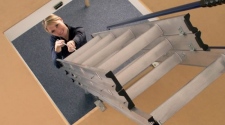Many people have osteoporosis and other bone-weakening issues. Osteopenia is a precursor to full blown osteoporosis and it is essentially a condition where bone density is lower than normal. Osteoporosis can actually be fatal. In more serious cases, osteoporotic hip fracture can cause death to up to a third of patients within 6 months. The chance can be higher on people who have sedentary lifestyle. BMD test is often used to indicate bone hardness, which is associated with the level of magnesium and calcium in our body. However, bone flexibility is also an essential factor that can prevent bone fracture and breakage.
Other than calcium, our bone should have enough collagen, a protein-rich substance, that can bring enough flexibility to our skeletal structure. If we want to have a flexible bone, it is important to consume enough vitamin K. It is available in various leafy green veggies. From vitamin K, our body synthesize a new variant, called vitamin K-2 or menaquinone, which has direct relation in the formation of collagen in our bone. It is found that people who have enough vitamin K has 30 percent less chance of giving hip fractures. Lettuce, kale and spinach aree particularly high in vitamin K and we should consume it.
Fortunately, vitamin K isn’t destroyed by the cooking process and this provides us with a peace of mind. If we are not sure that we are getting enough vitamin K, which is between 90 to 120mcg each day; it is a good idea to consume enough supplements. MK4 is another variant of vitamin K and it is found to reduce fractures by up to 80 percent! This is much higher than taking daily vitamin D and calcium supplements that only reduce fractures by 20 percent. However, we should be aware that high vitamin K intake and supplementation can block the action of several drugs, including warfarin or Coumadin.
In more serious cases of osteoporosis, drugs usages are needed. Bisphosphonate drugs are widely prescribed for people who have bone thinning problems, such as zoledronic acid (Zometa), reloxifence, risedronate and alendronate. However, we should be aware that drugs usages are less effective than long-term intake of vitamin K, when it comes to reducing the risks of fracture. As an example, sufficient availability of vitamin K and its derived substance can reduce the risk of vertebral fracture by 60 percent, compared to Fosamax at only 47 percent. There is also an indication that bone-building drugs can hurt our health.
Bisphosphanate drugs, such as Fosamax and others , are suspected to increase the risks of esophageal cancer and people with Barrett’s esophagus illness shouldn’t take these drugs. Bisphosphanate drugs also increase the likelihood of various heart irregularities, including arrhythmia. These drugs improve quantity, but unfortunately not bone quality. Long-term consumption of Bisphosphanate drugs could actually weaken bone, if we don’t take vitamin K and other beneficial substances. We should talk to our doctor, whether Bisphosphanate drugs are right for us. With proper treatment, risks of fracture can be reduced by about 65 percent or more.















